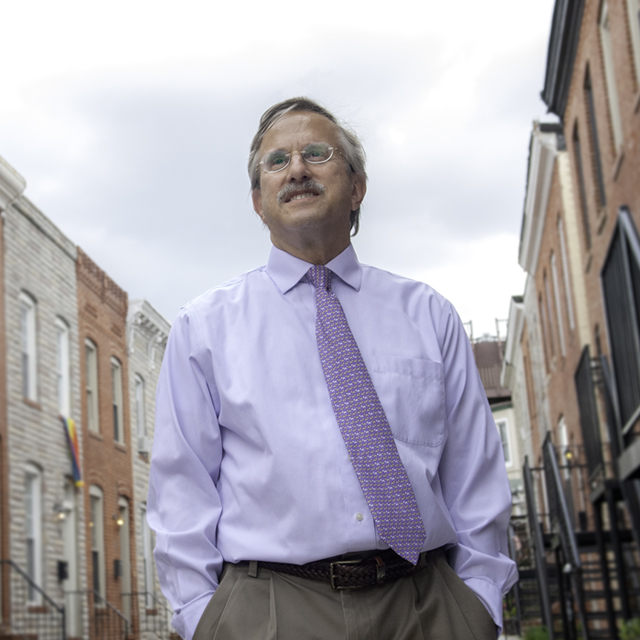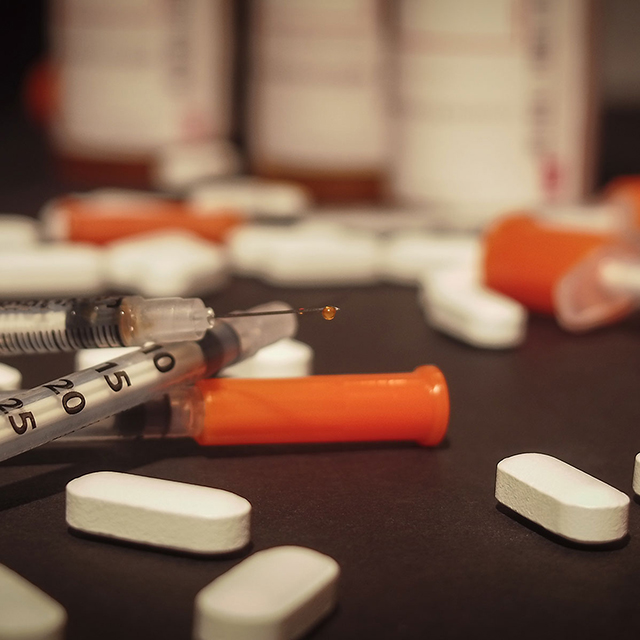In January 2020, after years of medicating herself with alcohol, heroin and cocaine, Melanie had a withdrawal seizure and was rushed to The Johns Hopkins Hospital. After 10 days of inpatient detoxification, Melanie was referred to the Johns Hopkins Broadway Center for Addiction. She says she was fortunate to find a bed in the Wilson House, a private rehabilitation facility connected with the Broadway Center and the Helping Up Mission.
“When I was using, I just wanted to pass out all day. Now every day is a new awakening,” Melanie says. “At the Wilson House, everyone knows your name and is invested in your recovery. During COVID, there aren’t as many Narcotics Anonymous or Alcoholics Anonymous meetings. You can do them on Zoom, but it feels very isolating. I need peer support. Here I can do my groups, and in between, I can talk to people who are also experiencing it. They understand me. Here, I’m surrounded by recovery.”
Melanie says the Wilson House provides an abundance of structure and kindness as well as the support of knowledgeable counselors.
“You never feel judged, and every staff member wants you to get better,” she says.
Melanie wakes up for breakfast at 6 a.m., and then attends an in-person group. Throughout the week, she has individual sessions with her counselors. She also takes methadone daily.
“We have a 7 p.m. curfew,” she explains. “We can only go out for 15 minutes to a half-hour. On weekends, we can get a day pass.”
Melanie contracted COVID-19 in March 2020. She was sent home to quarantine. Throughout her illness, her counselor called three times a week to check in.
“I was sick for five and a half weeks,” she says. “I have a lowered immune system, and I was really scared. I lost my sense of smell and taste, and I didn’t have an appetite.”
In July 2020, Melanie, fortunately, was completely symptom-free. She was tested for COVID-19 three times before she could return to the Wilson House.
“I wanted to come back for the structure,” Melanie says. “I had lost myself. I lost trust in my decisions, and I wanted to go back to enjoying life. Before, when I was drinking and using, I didn’t put a lot of faith in myself. Now I’m working on self-esteem and self-worth. I know now that I deserve sobriety.”
Melanie says the Wilson House has helped her build trust in herself and others.
“Trust issues are hard when you have an addiction,” she says. “You put yourself in predicaments where you can’t trust. Here, if they tell you something, they will do it. It’s been a big learning experience to live with other people and learn to be supportive and accept support. I am a lot better at accepting and asking for help. I’ve learned to be specific and ask for exactly what I need. I have to put my pride and ego to the side. If there’s anything I’ve learned here, it’s that I can’t do this by myself.”
Kenneth Stoller, director of the Johns Hopkins Broadway Center for Addiction and an associate professor of psychiatry and behavioral sciences at Johns Hopkins, says having supportive housing is an important part of a patient’s recovery.
“If someone is living on the street and doesn’t have shower facilities, then sitting in a group of people knowing that their peers can smell the streets on them is very stigmatizing,” Stoller says. “Having a good night’s sleep is also very important for a person’s mental health and ability to think clearly. If they’re not sleeping through the night, the next day they’re lethargic and tired and might be more likely to use drugs to get a false sense of energy. Housing also provides a positive environment where the patient is immersed in pro-recovery messaging and support.”
Stoller says the Broadway Center and the Wilson House coordinate medical and mental health care with the patients’ physicians. Many patients who have substance use disorders also experience co-occurring mental health conditions. The staff also assists with income maintenance, long-term housing programs, child care and vocational rehabilitation.
“Addiction is a disease of despair and isolation,” Stoller says. “A person who doesn’t have a sense of hope can’t work hard to do better. Due to the social determinants of health, many have social needs that, in a less comprehensive setting, would be barriers to effective treatment. It’s hard for a person to engage in substance use treatment if they’re homeless or if they don’t have access to transportation or they have untreated physical problems.”
Stoller says his staff is a very professional group who understands where their patients are coming from. They work to earn the trust of the patients by showing them that they are here to help and that the patients’ information will be kept confidential.
“We help patients begin to change the set of people they engage with every day, including our own staff. They have to have some level of trust that those people will not harm them,” Stoller says. “Patients are in a cycle. They are using drugs and feeling bad about it, then covering up their bad feelings through the use of drugs. The way to get out of that is by becoming involved in positive activities that can improve their self-esteem. People who feel good about themselves are less likely to do something self-destructive. The longer time they’re not using, the better they feel about themselves. We encourage them to engage in other activities that will make them believe in themselves and envision a positive future.”
A big part of that support system is Annies Bailey-Jackson, a residential counselor at the Wilson House. Bailey-Jackson facilitates groups on topics like preventing relapse, goal setting and learning new behaviors in recovery.
“I tell the women that if you change the way you think, your behavior will change,” Bailey-Jackson says. “Our patients have been so battered and beaten on the outside that when we bring them here, we work hard to show them that we care. We address the whole person, including the issues that play a major part in their drug use. It’s more than being abstinent from the drugs; it’s also about getting them the medical care they need.”
Bailey-Jackson says many patients have been self-medicating for years and dealing with conditions such as undiagnosed post-traumatic stress disorder or attention deficit disorder.
“Here, they finally get a moment of clarity,” she says. “For however long they’re here, we provide support for them so that when they have thoughts of using, they have coping skills and a relapse plan.”
Bailey-Jackson says patients learn to problem-solve and address their issues during group and individual sessions. They also learn how to maintain healthy relationships and recognize that they need self-esteem.
“We encourage them to be honest, open-minded and willing,” she says. “They’ve lost a lot of things along the way, and I don’t want them to dress up the outside and not the inside. I see how torn down and hopeless they were. When they leave, there’s a glow about them. This is just the beginning work; they have a journey, and I’m so glad to be part of it.”
Brenda Cheeks, a Broadway Center addictions counselor, agrees that housing is a good way to help patients focus on their recovery.
“There are no distractions,” she says. “It’s structured and they can focus on what they need to do to maintain abstinence. We work on their triggers and warning signs. We help them make an action plan. We help them change persons, places and things.”
Administrative program manager Toni Maynard-Carter says the whole staff takes an interest in each patient’s care.
“From the time they come in the door, we’re creating a treatment plan with them. We ask them what they feel they need and start from where they are. Everyone gets a physical exam, and we connect them to lots of services. We deal with every aspect of that person’s life. It can be so easy to give up. You have to rebuild relationships and work on yourself.”
Stoller says the team works to teach patients that substance use disorder is something they have, not something that defines them.
“Our patients are incredibly courageous people. They’re able to completely change their lives, learn new skills and meet new people,” he says. “They should expect that, at times, their disorder might flare up, and they shouldn’t be so hard on themselves when that happens. They should continue to stay in treatment and learn from those mistakes. By learning from their mistakes, they can come out stronger on the other side of a slip than before that happened. They can change.”



